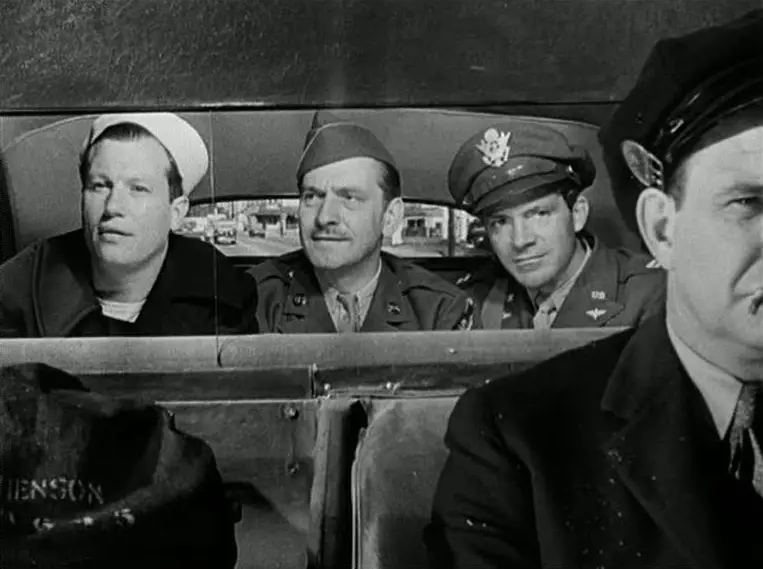
Posted on 03/16/2024 6:13:21 PM PDT by simpson96

The Best Years of Our Lives is a 1946 American drama film directed by William Wyler and starring Myrna Loy, Fredric March, Dana Andrews, Teresa Wright, Virginia Mayo and Harold Russell. The film is about three United States servicemen re-adjusting to societal changes and civilian life after coming home from World War II. The three men come from different services with different ranks that do not correspond with their civilian social class backgrounds.
The film was a critical and commercial success. It won seven Academy Awards: Best Picture, Best Director (William Wyler), Best Actor (Fredric March), Best Supporting Actor (Harold Russell), Best Film Editing (Daniel Mandell), Best Adapted Screenplay (Robert E. Sherwood), and Best Original Score (Hugo Friedhofer).
In addition, Russell was also awarded an honorary Academy Award, the only time in history that two such awards were given for a single performance.
It was the highest-grossing film in the United States since the release of Gone with the Wind.
"The Best Years Of Our Lives" (1946) aircraft graveyard scene
That is an amazing scene in a truly great movie.
L
Thank you for this thread.
I have watched this movie a number of times since I was very young.
The opening scenes in the aircraft boneyard were always amazing to me.
Of course when I was older, I understood much more about what these men had been through, on a deeper level.
The Greatest Generation, indeed.
Have see this movie but once, thirty or so years ago. About time for an another viewing. It was as I recall gripping and somewhat gritty and outstanding.
I would add:
11. Action in the North Atlantic
12. The Deer Hunter
13. Dr. Strangelove
14. What others, freepers? Otherwise an excellent list!
Stop. I have already sincerely apologized, and I meant it. Twice. You have never made mistakes of any kind I presume? Ever?
“12 O’Clock High” is another that I appreciated. The scene at the end, where his adjutant tenderly covers him up with blankets shows that his respect for the man goes deep, and his understanding that all men have a breaking point.
ore like a thousand or more times. Thousands of aircraft with very few flight hours and no combat time on them were scrapped.
A family friend (Tom Reilly) is one of the country’s best restorers of WW II aircraft, especially bombers. It sometimes takes him years to find the necessary parts and more time, effort, and money to buy them.
His nightmares were more severe and he couldn't accommodate his somewhat loose wife's desires for spending and partying.
In his wife he also saw the attitudes of the noninvolved people to ignore what had been their realties and to "just get over it".
All three had the strength to push through the injuries - physical and psychological - they had sustained, but it was dealing with the indifference and even hostilities of the civilians at home that gave them the greatest obstacles.
Interesting we see it the same way.
Clearly, the sailor who lost his hands seems like he would have the most hurdles mentally and physically to overcome, but he appears to be able to find a way to cope, and the Sergeant seems like he would have the fewest hurdles to adjustment, but it I find Captain Derry’s character to be the most complex.
The sailor said in his own words, something like “there was an explosion, I woke up and my hands were off”, so he probably didn’t have the same kind of emotional trauma someone else might have, such as Captain Derry, who watched his friend fall flaming from the sky.
There is also a particular pathos to Captain Derry that the other two don’t seem to have. Petty Officer Homer Parrish pretty much had the same things before he went off to war (apart from the obvious loss of his hands) as he did when he came back, as did Sergeant Al Stevenson.
But Fred Derry was a young soda jerk before he went off, and when he came back, he had learned and done things of consequence, assumed a role of responsibility and he couldn’t easily slide back into that role he had before the war. He had learned too much of himself and his capability to easily do that.
A remarkable movie indeed.
I will say this about “The Deer Hunter”...I tend to divide this movie into two parts...before they went off to war, and after they went off to war.
Apart from the drama of the concept of being imprisoned by the VC and forced to play Russian Roulette, I didn’t care for the second half.
But I did, contrary to most people (apparently) like the first half of the movie. Many people say it is boring, too long and such, but I liked the way it was done to set the stage. I just didn’t care for what they did with the stage after they got it.
Fair enough, thanks for your assessment.
Disclaimer: Opinions posted on Free Republic are those of the individual posters and do not necessarily represent the opinion of Free Republic or its management. All materials posted herein are protected by copyright law and the exemption for fair use of copyrighted works.